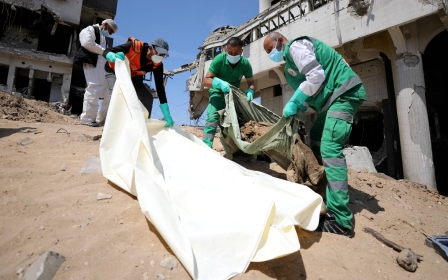British MPs grill ministers over arms exports to Israel as 800,000 flee Rafah

The British government continues to assess that Israel has the intent and capability to follow international humanitarian law even as 800,000 Palestinians have fled Rafah this month, the deputy foreign secretary has said.
“As of now, there is no change to what the foreign secretary set out in April in Washington,” Andrew Mitchell told the Business and Trade Committee on Tuesday.
In a hearing focused on UK arms sales to Israel, several MPs pressed Mitchell and other witnesses, including Minister for Industry and Economic Security and Conservative MP Alan Mak, to explain how the government could have come to its conclusions.
“Many of us will look at that evidence in the round and wonder how on earth someone can make a rational decision to keep arms export licences open,” said Labour MP and committee chair Liam Byrne.
Among evidence Byrne cited were admissions this month from Mitchell, as well as Foreign Secretary David Cameron and Middle East Minister Lord Ahmad, that they have not seen a credible plan from Israel about how it plans to protect civilians in Rafah during its long-promised operation.
New MEE newsletter: Jerusalem Dispatch
Sign up to get the latest insights and analysis on Israel-Palestine, alongside Turkey Unpacked and other MEE newsletters
He also pointed to a report by US President Joe Biden's administration that found it was “reasonable to assess” that Israeli forces used US weapons to violate international humanitarian law, as well as the International Criminal Court’s application this week for arrest warrants for Israeli Prime Minister Benjamin Netanayhu and Defence Minister Yoav Gallant.
Finally, Byrne said a court document filed by the Department for Business and Trade in a High Court case challenging UK arms sales to Israel suggested the government believed Israel had violated international humanitarian law when it linked the supply of humanitarian assistance in Gaza with the release of captives in late October.
Under intense scrutiny, Mitchell repeatedly emphasised that the government has reached its conclusions following “a very robust legal process”.
“We do not do these things as a whim of politicians. We do it in a way set down and authorised by act of parliament,” he said.
“We are not required to say that Israel has a clean bill of health. While we do not publish or comment on legal advice, we always act in a way that is consistent with it.”
Mitchell, however, conceded that “in view of the strength of feeling and the level of interest”, he would look into whether he could offer more detail in writing about the government’s international humanitarian law assessments.
“In view of what has been said this afternoon, we will see what additional information we can provide,” he said.
Delayed statistics
Over the 90-minute session, the ministers were also asked whether UK-supplied equipment had been used in either the 1 April World Central Kitchen convoy attack that killed three former members of Britain’s armed forces or the 18 January attack on a compound in Gaza housing staff working for British charity Medical Aid for Palestine.
Arms experts and campaigners have questioned whether the engine that powered the Hermes 450 drone, understood to have been used in the convoy attack, was UK-made. A UN investigation has meanwhile found that US and UK-manufactured weapons or parts were likely used in the January attack.
'Are you telling us that data provided to a court has not been provided to this parliament?'
- MP Liam Byrne
On the World Central Kitchen attack, Mitchell said: “We have not so far been able to identify any UK licences for any components or equipment for use by the IDF [Israeli army] with the Hermes 450.”
“In the last 10 years, we have granted a small number of export licences to Israel both for this drone type… and for specially designed components for this drone. However, none of those were for the use of the Israel Defence Forces.”
On the 18 January attack, Mitchell said “as far as” he knew, no UK-source equipment had been used.
MPs did not ask whether the Foreign Office or business department were still investigating if UK-made equipment had been involved, nor did the officials offer this information.
The witnesses were also grilled over why the business department has delayed the release of quarterly arms export statistics and provided more export data in court documents filed with the High Court than is currently available to the MPs.
“We’ve got a matter of global controversy, the UK’s position is under intensive debate here in this parliament and you cannot supply two members of this house with stats that should have been published some time ago,” Byrne said.
Kate Joseph, director general of the department’s economic security and trade relations, told the MPs that part of the reason for the delay of the data was that the department has been updating its digital systems.
“The work to update those systems has meant that it has taken a little longer to get those statistics right,” Joseph said.
Joseph and Mak said the statistics from 1 July to 31 December 2023 would be released on 13 June.
Additionally, Mak said an “ad hoc data release”, prepared on an exceptional basis given the interest on the topic, would be produced, covering licences approved and refused for arms exports to Israel between 7 October 2023 and the end of May 2024.
When pressed, Joseph said that the department had provided the High Court with data through the end of November 2023.
“Hang on,” said Byrne. “Are you telling us - are we hearing this correctly - that data provided to a court has not been provided to this parliament?”
Joseph responded: “We have provided data to the court and that data has, I believe, been made publicly available by the claimants in court, and what we are doing now is providing a further update to that.”
“Because the data that we provided to the court was then made public, we are now committing to the committee that we will provide a more up-to-date version of that data which will take us up to the end of May.”
Byrne then said: “As we sit here today, the courts of this land are better informed on the data for arms exports than the parliament of this land.”
The ad hoc release is expected on or around 7 June.
Middle East Eye delivers independent and unrivalled coverage and analysis of the Middle East, North Africa and beyond. To learn more about republishing this content and the associated fees, please fill out this form. More about MEE can be found here.





